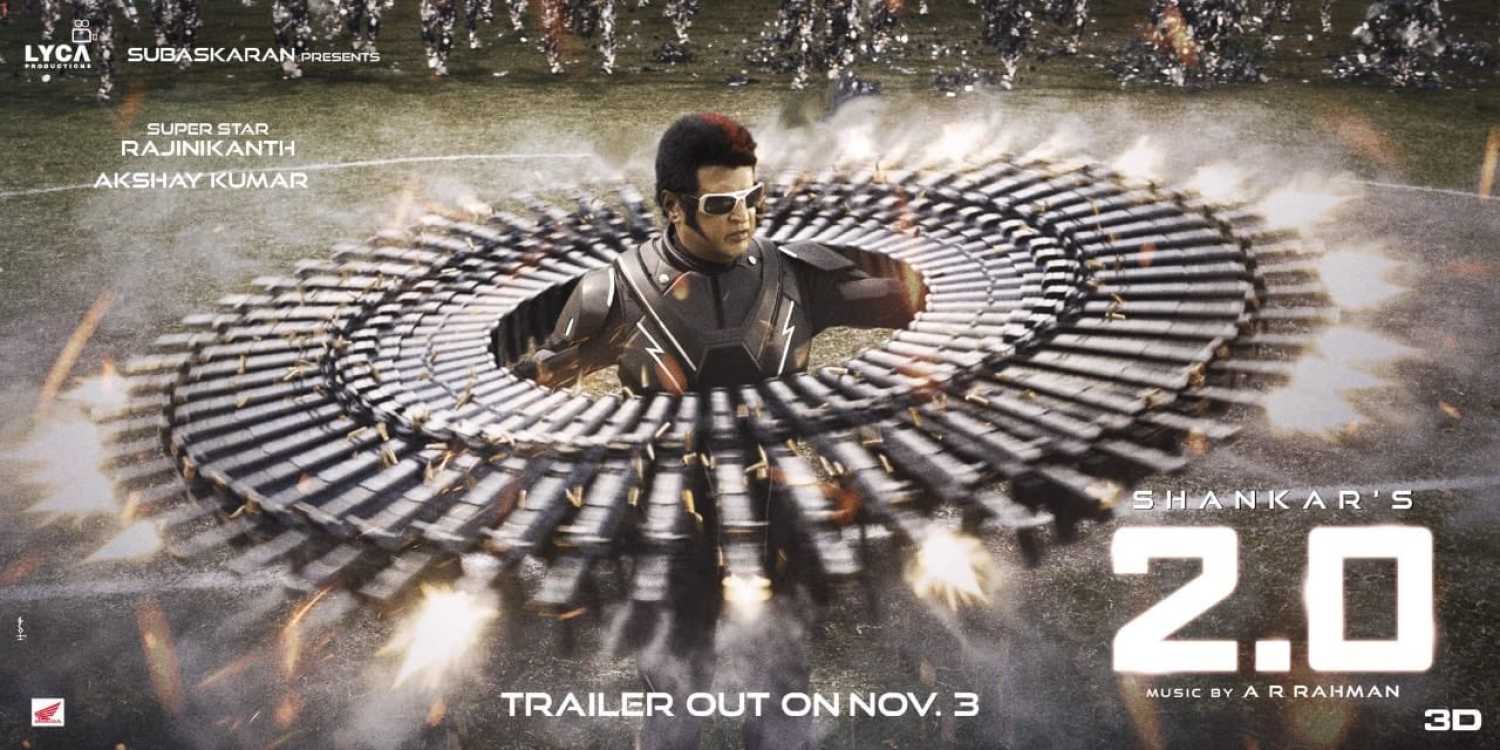Shankar's elaborate vision is hard to believe, but sustains itself with 3D technology and the larger-than-life appeal of Rajinikanth and Akshay Kumar.
2.0 review: Rajinikanth reboots as the star of this fantastic, entertaining 3D universe
Mumbai - 29 Nov 2018 18:00 IST
Updated : 30 Nov 2018 2:09 IST


Shriram Iyengar
Film: 2.0
Director: S Shankar
Cast: Rajinikanth, Akshay Kumar, Amy Jackson
Rating: ***
The massive scale, budget and buzz around S Shankar's 2.0 are justified in the very credits as the film opens. The immersive 3D is the beginning of a massive spectacle, the only terms that can, perhaps, describe the Rajinikanth-Akshay Kumar-starrer. A film about technology as a cause of destruction is brought to life using the most advanced cinematic technology available.
The key plot of the film revolves around the harmful radiation spread by the exponential growth of cell phones across the world, causing harm to birds.
Ornithologist Dr Pakshirajan (Akshay Kumar) leads his crusade against this very cause. But no one heeds his words. So he decides to take revenge on the people who killed his birds, except in a form that is beyond the scope of technology. The only way to stop him is for Dr Vaseegaran (Rajinikanth) to reboot his defunct android, Chitti.
This social message is encrypted quite heavily throughout the film. Shankar pits technology as the master rather than as a tool of mankind. Unrealistic it might be, but it is not without its kernel of truth. Surprisingly, there are no major songs in the film to interrupt the action or story sequences. However, the anti-climax towards the end is a dampener.
The most astonishing aspect of the film is its scale. Touted as one of the most expensive films of Indian cinema, Shankar delivers with elan. The first scene of the sentient mobile phones hatching a murder is one to remember. So is the sight of the metal crow tearing through the skyscape of Chennai.
The climactic battle sequences have an impact because of their sheer scale. While natural might not be the right term, the 3D sequences are certainly not jarring and fit in organically with the storyline. At one point, your reviewer could notice the cracks and scratches on the mobile screens. That attention to detail is certainly impressive.
As a visual spectacle, the film offers an immersive experience. If the price is not a barrier, more filmmakers might be willing to experiment with such technology to enhance their stories.
In Pa Ranjith's Kaala (2018), Rajinikanth took on a character that was closer to his age. In 2.0, his age becomes a disadvantage. Despite his presence and unchanged charisma, the actor looks visibly aged in some action sequences.
Shankar papers over these cracks with some snappy one-liners. The director reserves some of the best lines for Chitti's rebooted version, which is entertaining. The 'bad boy' robot reminds audiences of the stylish villainy that catapulted Rajinikanth to superstardom in the 1970s.
Akshay Kumar has a fairly limited presence as the ornithologist Dr Pakshirajan. The actor scarcely makes an appearance till the key moment before the interval but looms large as a presence. He delivers the social message in the film with good effect, but seems a little out of place with his gimmicky villain. The elaborate costumed version of his demon is a brilliant creation. While the element of his transformation is scarcely believable, it needs to be accepted as a part of the fantastic scheme.
Amy Jackson brings some levity to her role as the emotive, overly filmi android. Despite her fairly improved screen time, her character is limited. The actress plays the android N.I.L.A, and, surprisingly, is a good fit. As the emotive android that watches films and listens to gossip, the actress is effective. Of course, there is even a cameo appearance of Aishwarya Rai's voice on the phone calls, as a continuation from the first film.
While the film delves into the science of robotics, aside from the mention of Isaac Asimov in the opening scenes, Shankar keeps it simple. The science soon merges into pseudo-science with the emergence of Akshay Kumar's 'birdman'. But, to complain about that is irrelevant. Films like James Cameron's Avatar (2009) and Michael Bay's Transformers (2007) were not exactly built on sound scientific foundations either. The science simply forms a façade for the spectacle of entertainment.
2.0 is grand in its ambition and manages to justify it with elaborate visual style and effect. Whether the film manages to recoup the money spent on its making (around Rs510 crore) at the box office remains to be seen, but it is a film that reminds us what a 'big screen' theatre experience is like. With more people drowned in the visuals of their mobile phones, perhaps such grandiose effects are needed to draw them back to the theatres.
Related topics
Movie Review





